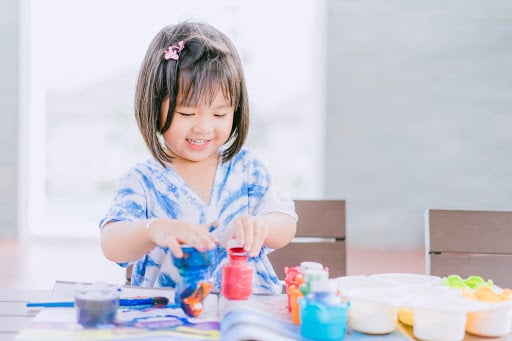Helping Your Child Learn
How Do Children Learn?

2. Auditory learners need to listen and hear as opposed to seeing like visual learners. Using the same example of learning about how a tree grows, auditory learners need to hear the process about how a tree grows. Saying it out loud a few times and maybe even singing a song helps them tremendously. You might have noticed this in older children who sometimes close their eyes tightly in concentration as they are trying to listen and respond appropriately. Auditory learners learn best when a concept is verbally explained to them.

3. Kinesthetic learners need action and even touch to learn. To learn about how a tree grows, kinesthetic learners would need to touch real trees and mimic the actions involved to understand the concept. Babies and toddlers tend to learn about their environment this way by touching everything within their grasp. Children who are kinesthetic learners will enjoy learning activities where they can role-play and move around a lot. They also enjoy copying others.

How Can You Support Your Child’s Learning?
- Make learning look fun
To make learning an enjoyable experience that your child loves, parents have to first demonstrate a positive attitude towards education. This could mean managing your own expectations and goals of learning for your child, for example, not defining learning as a tool to achieve good grades in school. Consistently highlight the joys of learning rather than portray it as a chore that your child might slowly learn to dread. - Engage and encourage
Take time to ask your child what they have learnt in school e.g. what did they find Interesting, was there anything new that the teacher taught. Encourage them to ask you questions on matters that pique their curiosity. Playing games or letting them interact with other children can also be an effective means to train problem-solving skills in your child. - Don’t neglect values and morals
Apart from academics and skills, an important component of learning includes social graces and ethics. Teach your child to be polite and considerate to others through your own actions. Children very often learn their behaviours from the adults. Promote honesty in your child by praising them for the courage they exhibit when owning up to mistakes. Allowing them to interact in groups also helps to impart values such as generosity when they share toys or food with others. Lastly, engage them in simple chores such as putting their toys back after play to instill a sense of responsibility and independence in your child
Learning Together With Your Child

Conclusion
Parents should try and find a balance where they are able to play an active role in their children’s learning but not be too overwhelming. You can share facts you know your children might find interesting, ask them questions about how their day at school was and if they learned anything new. Finding ways to experience and explore new and exciting things together will help you learn more about your child and even vice versa. All children are unique and special in their own way. Therefore, it will take some time, energy and patience, especially on the parent’s part to figure what works best for you and your children. Do not forget that you can make a big difference when it comes to your children’s learning process.

